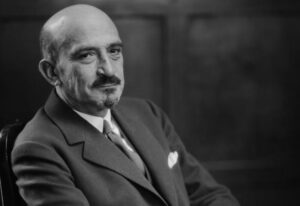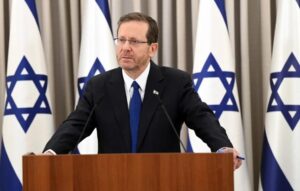Below is a detailed table listing all the presidents of Israel since the country’s inception:
| President | Term in Office |
|---|---|
| Chaim Weizmann | 1949-1952 |
| Yitzhak Ben-Zvi | 1952-1963 |
| Zalman Shazar | 1963-1973 |
| Ephraim Katzir | 1973-1978 |
| Yitzhak Navon | 1978-1983 |
| Chaim Herzog | 1983-1993 |
| Ezer Weizman | 1993-2000 |
| Moshe Katsav | 2000-2007 |
| Shimon Peres | 2007-2014 |
| Reuven Rivlin | 2014-2022 |
| Isaac Herzog | 2022-Present |
READ ALSO: Presidents That Have Ruled Azerbaijan Till Date
Chaim Weizmann: The First President of Israel

Chaim Weizmann, a prominent Zionist leader and chemist, was elected as the first President of Israel in 1949. He served until he died in 1952. Weizmann was born in 1874 in what is now Belarus and was a key figure in the Zionist movement, advocating for the establishment of a Jewish homeland in Palestine.
During his presidency, Weizmann worked to gather international support for Israel, particularly from the United States. He also played a role in the establishment of several institutions of higher learning, including the Hebrew University of Jerusalem.
Achievements
1. Balfour Declaration: One of Weizmann’s most significant achievements was his instrumental role in securing the Balfour Declaration in 1917, which expressed British support for the establishment of a “national home for the Jewish people” in Palestine.
This declaration was pivotal in garnering international legitimacy for the Zionist movement and laid the groundwork for the eventual establishment of the State of Israel
2. Founding the Weizmann Institute: Weizmann was a prominent scientist and established the Weizmann Institute of Science in Rehovot, Israel. This institution has become a leading research center, contributing significantly to science and technology in Israel and globally.
3. Diplomatic Relations: As a key figure in the Zionist movement, Weizmann was adept at building relationships with influential political leaders, particularly in Britain. His diplomatic efforts helped to secure support for Jewish immigration to Palestine and the establishment of Jewish institutions.
READ ALSO: Presidents That Have Ruled Tajikistan Till Date
Downsides
1. Limited Political Influence: Despite his significant contributions to the Zionist movement, Weizmann faced challenges in translating his diplomatic successes into effective governance once Israel was established. His presidency was largely ceremonial, and he struggled to exert real political power in a rapidly changing political landscape.
2. Criticism from Within the Jewish Community: Weizmann’s centrist position often put him at odds with both left-wing and right-wing factions within the Zionist movement.
His inability to fully align with either side led to criticism and diminished support from various groups, particularly as tensions escalated between Jewish and Arab communities.
3. Complex Legacy Regarding Palestinians: Weizmann’s vision for a Jewish homeland often overlooked the implications for the Arab population in Palestine. His statements and policies have been criticized for lacking consideration of Palestinian rights and aspirations, contributing to ongoing tensions in the region.
Isaac Herzog: The Current President

Isaac Herzog, a member of the Labor Party, became the 11th President of Israel in 2022. Herzog was born in 1960 in Tel Aviv and previously served as a member of the Knesset, leader of the Opposition, and chairman of the Jewish Agency for Israel.
He is the son of Chaim Herzog, who served as the sixth President of Israel from 1983 to 1993. As president, Herzog has focused on promoting social cohesion and addressing economic disparities in Israeli society.
READ ALSO: Presidents That Have Ruled The United Arab Emirate Till Date
Achievements
1. Social Cohesion Initiatives: Since taking office, President Isaac Herzog has focused on promoting social cohesion in Israel. He has initiated dialogues aimed at bridging gaps between different communities, including Jewish and Arab citizens, fostering a sense of unity in a diverse society.
2. International Relations: Herzog has worked to strengthen Israel’s international relations, particularly with Jewish communities worldwide. His efforts to engage with diaspora Jews have helped reinforce ties and support for Israel, especially during challenging times.
3. Addressing National Challenges: Herzog has been vocal about addressing pressing national issues, such as economic disparities and social justice. He has called for policies that promote equality and inclusivity, aiming to create a more equitable society.
READ ALSO: Presidents That Have Ruled Yemen Till Date
Downsides
1. Limited Executive Power: As president, Herzog’s role is largely ceremonial, which limits his ability to enact significant change. While he can influence public discourse, he lacks the direct power to implement policies, which can be frustrating for those expecting more decisive leadership.
2. Criticism of Political Neutrality: Herzog has faced criticism for his perceived inability to remain politically neutral, especially during times of political turmoil in Israel. Some have accused him of favoring certain political factions, which can undermine the trust of various communities in his leadership.
Note: Israel does not have a vice president but the next person after that position is the deputy prime minister who and the deputy prime minister of Israel is: Yariv Levin
